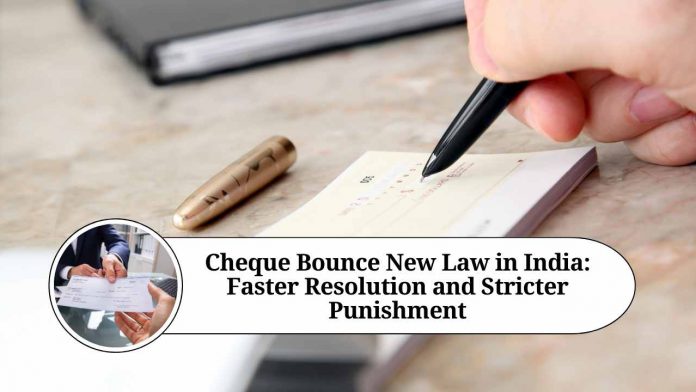Cheque Bounce New Law in India: Understanding the Recent Changes
Cheque bounce is a common issue in India that has been affecting businesses and individuals for a long time. However, the Indian government has taken some significant steps to tackle this problem. In 2018, the government introduced a new law, the Negotiable Instruments (Amendment) Act, 2018, to address cheque bounce cases. In this blog post, we will discuss the new law in detail and its implications.
Background
Cheque bounce is a common issue that arises when a person issues a cheque but does not have sufficient funds in their account to cover the cheque’s amount. This leads to the cheque being returned by the bank, resulting in a loss for the beneficiary. Cheque bounce cases are common in India and can be a significant problem for businesses, which rely heavily on cheques for transactions.
The Negotiable Instruments (Amendment) Act, 2018
The Negotiable Instruments (Amendment) Act, 2018, is a law that amends the Negotiable Instruments Act, 1881. The new law has made several changes to the way cheque bounce cases are handled in India. Some of the significant changes are:
- Faster resolution of cases: The new law has introduced a provision that requires cheque bounce cases to be resolved within six months from the date of filing the complaint. This will help expedite the process and provide quicker relief to the affected parties.
- Jurisdiction: Earlier, a cheque bounce case could only be filed in the place where the cheque was dishonoured. However, the new law has allowed the complainant to file the case in the place where the cheque was issued or where the bank branch of the complainant is located.
- Compounding of offences: The new law allows for the compounding of offences related to cheque bounce. This means that the complainant and the accused can come to a settlement, and the case can be closed without going to trial. However, this is allowed only for first-time offenders.
- Punishment for repeated offences: The new law has introduced stricter punishment for repeat offenders. If a person has been convicted of cheque bounce twice or more, they can face imprisonment for up to two years and a fine of up to twice the amount of the cheque.
Implications of the New Law
The new law has several implications for businesses and individuals in India. Some of the significant implications are:
- Faster resolution of cases: The provision for resolving cases within six months will help businesses and individuals get quicker relief in cheque bounce cases.
- Increased flexibility: The provision for filing cases in the place where the cheque was issued or where the bank branch of the complainant is located provides more flexibility to the parties involved.
- Compounding of offences: The provision for compounding of offences will help reduce the burden on the courts and provide a quicker resolution to the parties involved.
- Stricter punishment for repeat offenders: The provision for stricter punishment for repeat offenders will act as a deterrent and reduce the number of cheque bounce cases in the long run.
While the new law provides faster resolution and stricter punishment, it is always advisable to take the necessary precautions to avoid cheque bounce cases. Here are some tips to help you avoid cheque bounce:
- Maintain Sufficient Balance: Ensure that you have sufficient balance in your account before issuing a cheque. Keep track of your account balance and avoid issuing a cheque if you do not have sufficient funds.
- Verify Details: Double-check the details such as the date, payee’s name, and amount before issuing the cheque. Any errors in the cheque can lead to it being dishonoured.
- Keep Track of Cheques: Keep track of the cheques you have issued and ensure that they are encashed within a reasonable time. If a cheque is not encashed, cancel it and issue a new one.
- Use Online Payment Methods: With the advancement in technology, online payment methods such as NEFT, RTGS, and UPI have become popular. Using these methods can help you avoid cheque bounce cases altogether.
Conclusion
In conclusion, cheque bounce cases can be a significant problem for businesses and individuals in India. The new law provides faster resolution and stricter punishment for repeat offenders. However, it is always advisable to take the necessary precautions to avoid cheque bounce cases altogether. By maintaining sufficient balance, verifying details, keeping track of cheques, and using online payment methods, you can avoid cheque bounce cases and ensure that your transactions are smooth and hassle-free.
Read more useful content:
Frequently Asked Questions (FAQs)
What is cheque bounce?
A: Cheque bounce is a situation where a cheque issued by a person or an entity is returned by the bank due to insufficient funds in the account.
What is the new law on cheque bounce in India?
A: The new law on cheque bounce in India is the Negotiable Instruments (Amendment) Act, 2018, which amends the Negotiable Instruments Act, 1881.
What are the key provisions of the new law?
A: The key provisions of the new law include faster resolution of cases, jurisdiction, compounding of offences, and stricter punishment for repeat offenders.
Can I file a cheque bounce case anywhere in India?
A: Under the new law, a cheque bounce case can be filed in the place where the cheque was issued or where the bank branch of the complainant is located.
How long does it take to resolve a cheque bounce case?
A: The new law requires cheque bounce cases to be resolved within six months from the date of filing the complaint.
Can a cheque bounce case be settled out of court?
A: Yes, the new law allows for the compounding of offences related to cheque bounce, which means that the complainant and the accused can come to a settlement and close the case without going to trial.
Can a cheque bounce case be filed against a company or an individual?
A: A cheque bounce case can be filed against both a company and an individual.
What happens if a cheque bounces due to technical reasons such as a signature mismatch?
A: If a cheque bounces due to technical reasons such as a signature mismatch, the cheque issuer may have to provide a new cheque or make alternate payment arrangements.
Can a person be imprisoned for cheque bounce?
A: Yes, a person can be imprisoned for up to two years for repeated cheque bounce offences.
How can I avoid cheque bounce cases?
A: You can avoid cheque bounce cases by maintaining sufficient balance in your account, verifying details, keeping track of cheques, and using online payment methods.




















